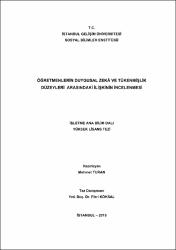| dc.contributor.author | Turan, Mehmet | |
| dc.date.accessioned | 2018-12-05T12:10:58Z | |
| dc.date.available | 2018-12-05T12:10:58Z | |
| dc.date.issued | 2015-01-29 | |
| dc.identifier.uri | https://hdl.handle.net/11363/124 | |
| dc.description | Danışman: Fikri Köksal | en_US |
| dc.description.abstract | Bu tezin konusu "Öğretmenlerin duygusal zekâ ve tükenmişlik düzeyleri ve bazı değişkenler ile arasındaki ilişkinin incelenmesi"dir. Bu doğrultuda bu tezin amacı duygusal zekâ ve tükenmişlik ve bazı değişkenlerin anlamlı şekilde farklılaşıp farklılaşmadığını incelemektir. Araştırmanın çalışma grubunu 2013-2014 eğitim-öğretim yılında İstanbul'un Beylikdüzü ilçesinde 157 öğretmenden oluşturmaktadır. Araştırmada veri toplama aracı olarak "Duygusal Zekâ Ölçeği", "Maslach Tükenmişlik Ölçeği" ve "Kişisel Bilgi Formu" kullanılmıştır. Analizler SPSS 16.0 paket programı aracılığıyla .05 anlamlılık düzeyinde test edilmiştir. Verilerin analizinde Pearson Korelasyon testi ve tek yönlü varyans analizi (ANOVA) kullanılmıştır. Elde edilen bulgulara göre; öğretmenlerin tükenmişlik ve duygusal zekâ, düzeyleri; pozitif duygusal değerlendirme alt boyutu ve kişisel başarı alt boyutu; empatik duyarlılık alt boyutu ve kişisel başarı alt boyutu; pozitif duygusal yönetim alt boyutu ve kişisel başarı alt boyutu; duyguların olumlu kullanımı alt boyutu ve kişisel başarı alt boyutu arasında orta düzeyde, negatif ve anlamlı bir ilişki vardır. Öğretmenlerin pozitif duygusal değerlendirme alt boyutu ve duygusal tükenme alt boyutu; pozitif duygusal değerlendirme alt boyutu ve duyarsızlaşma alt boyutu; empatik duyarlılık alt boyutu ve duyarsızlaşma alt boyutu; pozitif duygusal yönetim alt boyutu ve duygusal tükenme alt boyutu; pozitif duygusal yönetim alt boyutu ve duyarsızlaşma alt boyutu; duyguların olumlu kullanımı alt boyutu ve duyarsızlaşma alt boyutu arasında düşük düzeyde, negatif ve anlamlı bir ilişki vardır. Öğretmenlerin empatik duyarlılık alt boyutu ve duygusal tükenme alt boyutu ile duyguların olumlu kullanımı alt boyutu ve duygusal tükenme alt boyutu arasında anlamlı bir ilişki yoktur. Cinsiyet, yaş, aylık gelir, branş, meslekte hizmet süresi ve öğrenim durumu değişkeni açısında duygusal zekâ ve tükenmişlik düzeyleri arasındaki fark anlamlı değildir. Bunun yanında medeni durum değişkeni açısında duygusal zekâ düzeyleri arasındaki fark anlamlıdır. Yani evli öğretmenlerin duygusal zeka düzeyleri bekar öğretmenlere göre daha yüksektir. Tükenmişlik düzeyleri arasındaki fark ise anlamlı değildir. | en_US |
| dc.description.abstract | The subject of this thesis is "Emotional Quotient" and the burnout of teachers and to search the relationship between some variables. Therefore, the purpose of this thesis is to search to see if there is any significant differentiation between emotional quotient, burnout and the certain variables. This research is comprised of 157 teachers from the 2013-2014 academic year in Beylikduzu, Istanbul. The data were collected using "Emotional Quotient Inventory", "Maslach Burnout Inventory" and "Personal Information Form". Analyses were tested at the .05 level of significance using the "Statistical Package for the Social Sciences - SPSS 16.0" software package. In addition, in the analysis of data "Pearson's correlation test and one-way analysis of variance (ANOVA) were used. According to the findings; between teacher burnout and emotional intelligence levels; positive emotional evaluation dimensions and sub-dimensions of personal success: empathic sensitivity subscale and personal accomplishment subscale; positive emotional management dimensions and sub-dimensions of personal success; the use of positive emotions and sub-dimensions of personal success, there is a moderate level of a negative and significant relationship. Between teacher's positive emotional evaluation and emotional exhaustion subscale dimensions; positive emotional evaluation subscale and depersonalization subscale; empathic sensitivity subscale and depersonalization subscale; positive emotional management dimensions and sub-dimensions of emotional exhaustion; positive subscale of emotional management and depersonalization subscale; the use of positive emotion subscales and depersonalization subscale, there is a low level of a negative and significant relationship. There is not a significant relationship between Empathic sensitivity subscales of the teachers and the use of positive emotions and emotional exhaustion subscale. Based on the gender, age, income, branch, the length of service and educational status, there are no significant differences between emotional intelligence and burnout levels. However, there is a significant difference in terms of marital status variable for emotional intelligence levels. Therefore, married teachers' emotional intelligence levels are higher than single teachers. However, the difference between burnout levels is not significant. | en_US |
| dc.language.iso | tur | en_US |
| dc.publisher | İstanbul Gelişim Üniversitesi Sosyal Bilimler Enstitüsü | en_US |
| dc.rights | info:eu-repo/semantics/openAccess | en_US |
| dc.subject | Research Subject Categories::SOCIAL SCIENCES | en_US |
| dc.subject | Research Subject Categories::SOCIAL SCIENCES::Social sciences::Psychology | en_US |
| dc.title | Öğretmenlerin Duygusal Zeka ve Tükenmişlik Düzeyleri Arasındaki İlişkinin İncelenmesi | en_US |
| dc.title.alternative | Examining the Relationship Between Emotional Intelligence and Level of Burnout of Teachers | en_US |
| dc.type | masterThesis | en_US |
| dc.relation.publicationcategory | Tez | en_US |

















